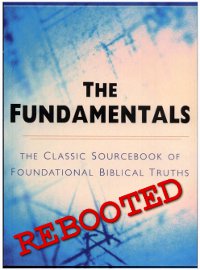Chapel Messages at BJU by J. D. Crowley
I have been pleasantly surprised and greatly encouraged and was interested in other reactions.
As iron sharpens iron,
one person sharpens another. (Proverbs 27:17)
 A few weeks ago, Standpoint Conference began to actively promote our conference for 2011, entitled “The Fundamentals II.” There are actually a number of compelling reasons to “reboot” The Fundamentals,* re-analyzing good doctrine in light of certain attacks of our time.
A few weeks ago, Standpoint Conference began to actively promote our conference for 2011, entitled “The Fundamentals II.” There are actually a number of compelling reasons to “reboot” The Fundamentals,* re-analyzing good doctrine in light of certain attacks of our time.
 The entire “Now About Those Differences” series is available here.
The entire “Now About Those Differences” series is available here.
Fundamentalism surfaced in about 1900 as a doctrinal and ecclesiastical reaction against the influence of theological liberalism. It did not, however, begin ex nihilo. It grew out of an American evangelical coalition that stretched across the denominations, produced the Bible conference movement, built mission agencies and Bible institutes, and produced The Fundamentals. This coalition has come to be known as proto-fundamentalism.
By 1920, proto-fundamentalism had become less well defined than it had been in the 19th Century. Around the turn of the century, a generation of leadership had died off. New leaders took time to emerge. In 1914, attention was diverted by a war in Europe and, eventually, around the world. The result was that proto-fundamentalist efforts tended to be more sporadic and desultory than they had been before 1900.
If proto-fundamentalism had lost definition by 1920, early fundamentalism had not yet gained definition. The people who took the label fundamentalist clearly aimed to oppose liberalism, not merely doctrinally, but also ecclesiastically. Nevertheless, Laws’s original definition did not specify who actually belonged in the movement and who did not. The result was considerable confusion.
Oliver W. Van Osdel, pioneer separatist and father of the Regular Baptist movement, refused to be called a fundamentalist. He saw fundamentalism as a weak and compromising effort. J. Gresham Machen made the best case for fundamentalist ideas, but he was uncomfortable both with fundamentalism’s doctrinal minimalism and its populism.
 The entire “Now About Those Differences” series is available here.
The entire “Now About Those Differences” series is available here.
Continued from last week…
To fundamentalists, Graham’s conduct was as inexplicable as it was inexcusable. True, Graham preached the gospel. In his conduct, however, Graham effectively denied the right of the gospel to define the boundary of Christian faith and fellowship. At Fuller Seminary, Carnell opined that some liberals were more pious than fundamentalists; Graham simply put Carnell’s theory into action.
As far as fundamentalists were concerned, faithfulness to the gospel required repudiation of the neo-evangelical agenda. Fundamentalist leaders could not endorse what Carnell said and they would not participate in what Graham did. It is not simply that they saw Graham’s conduct as sinful—they saw it as a scandalous betrayal of the gospel itself. They refused to recognize Graham, Carnell, and their ilk as legitimate Christian leaders.
This is the practice that some labeled “secondary separation.” Whatever one thinks of that label, it is clear that separation from neo-evangelicals was no afterthought or appendage to fundamentalism. It was the only faithful way of implementing fundamentalist ideals.
Theological liberalism is apostasy and liberals are apostates. Apostates are enemies of the gospel and, therefore, enemies of Christ. To extend Christian fellowship to an apostate (a liberal) is to make common cause with Christ’s enemies against Him. If an apostate is an enemy, then a neo-evangelical must be considered a traitor to the cause of Christ. Why would anyone point to such a person as an example of Christian virtue? How could a fundamentalist knowingly follow such leadership?
Fundamentalists did not separate from neo-evangelicals because of petulance. They separated because they really had no choice. The gospel was at stake. It was being denied by liberals and betrayed by neo-evangelicals.
Separation from new evangelicalism was necessary, and by the mid-1960s it had become a characteristic of fundamentalists. At this point in history, however, some fundamentalists adopted attitudes that guaranteed the disintegration of their movement. Not all fundamentalists shared these attitudes, but those who did managed to confuse the idea of fundamentalism in important ways.

Q: My impression is that the Preserving the Truth conference is a brand new event. Am I right about that?
A: Yes!
Q: Where did the idea for a “Preserving the Truth” conference come from and why that particular emphasis?
 The entire “Now About Those Differences” series is available here.
The entire “Now About Those Differences” series is available here.
No study of the relationship between fundamentalism and conservative evangelicalism would be complete without a discussion of separation. Since 1947 at the latest, the doctrine and practice of separation has been the single factor that has most distinguished fundamentalists from other evangelicals. For that reason alone, we need to ask whether separation is also a difference between fundamentalists and conservative evangelicals.
How we answer this question is going to depend upon how we define both fundamentalism and conservative evangelicalism. Solidifying those definitions is a more complicated business than an outsider might assume. From a secular or theologically liberal point of view, anyone who treats Scripture as normative and authoritative is a fundamentalist—up to and often including the Evangelical Left. At the opposite extreme is the following resolution, passed by the Fundamental Baptist Fellowship in 1979:
The Fundamental Baptist Fellowship recognizes the danger of the movement known as pseudo-fundamentalism, sees it as new evangelicalism in embryonic form, and calls upon all local Bible-believing churches to reject pseudo-fundamental activities as those of the Jerry Falwell ministries.
Strengthened versions of this statement were adopted by the FBF for several years. Other fundamentalists have made even more extreme pronouncements. The result is an odd situation. Liberals often see evangelicals as fundamentalists, while some fundamentalists have accused other fundamentalists of being incipient or actual neo-evangelicals.
Of course, Falwell and his sympathizers objected to being called “pseudo” anything. They insisted that they represented true, “historic” fundamentalism, tracing their pedigree to the authors of The Fundamentals. They took the position that one became a fundamentalist simply by affirming the fundamentals. According to this revision, historic fundamentalists believed in separation from unbelievers and apostates, but rarely or never from other believers.
Discussion